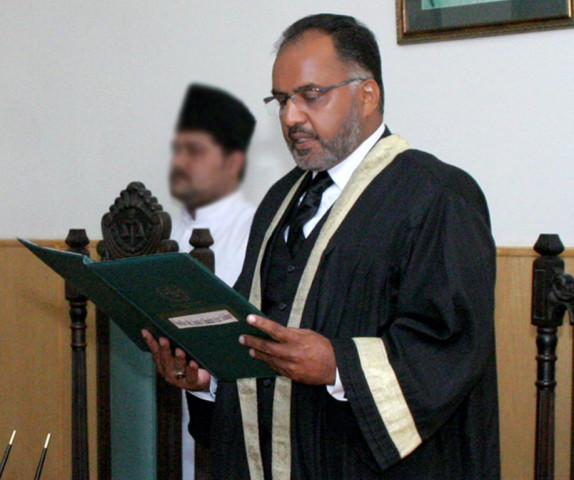Show cause: SJC will proceed further against IHC judge
Justice Siddiqui made remarks on army’s role in Faizabad sit-in

Islamabad High Court (IHC) Justice Shaukat Aziz Siddiqui. PHOTO: MUHAMMAD JAVAID / EXPRESS
The SJC, headed by Chief Justice of Pakistan Mian Saqib Nisar, had issued another show cause notice to Justice Siddiqui for questioning the role of the ‘constitutional institution’ in the matter related to the Faizabad sit-in last year. In response to the notice, the IHC judge submitted his reply in the SJC on Monday.
The reply states that a show cause issued to him by the SJC is “unprecedented, confusing, ambiguous, vague and evasive”.
The IHC judge, in his reply, says that for a senior army official, signing an agreement or distribution of money among demonstrators cannot be termed his constitutional duty.
Sources told The Express Tribune that Siddiqui appeared before the council on Tuesday, and the SJC has decided that it would proceed further in this matter.
SJC action: IHC judge disputes ‘vague’ show-cause notice
The attorney general for Pakistan has been directed to provide news clippings. Likewise, the IHC judge will provide copies of writ petitions against the Faizabad sit-in as well as his orders. The case hearing has been adjourned until April 4. This is the second reference against the IHC judge.
Meanwhile, in a matter related to another IHC judge, the council adjourned the proceedings until March 28 for arguments. Sources revealed that evidence in this matter has been closed. Waseem Sajjad is representing the IHC judge.
Earlier, Justice Farrukh Irfan of the Lahore High Court (LHC) on Tuesday sought a stay on the SJC proceedings against him from the apex court.
The proceedings had been initiated against the LHC judge in the wake of him being named in Panama Papers in 2016.
The five-judge larger bench, headed by Justice Azamt Saeed Sheikh, resumed the hearing. Hamid Khan, the counsel for the LHC judge, requested the court to halt the proceedings till a judgment on his client’s petition seeking an open trial had been delivered. He expressed anxiety over the March 6 SJC proceedings against the LHC judge
Observing that the petitioner’s anxiety needed to be addressed, Justice Azmat Saeed Sheikh said the court did not want to make the constitutional petitions infructuous. “Don’t embarrass us and the court,” he said. “We don’t want to pass stay order unless deemed necessary.”
Attorney-General of Pakistan (AGP) Ashtar Ausaf Ali informed the bench that he would appraise the SJC on Wednesday. Upon this, the court adjourned the hearing for a day.
Justice Azmat Saeed Sheikh, however, said that in-camera proceedings were available in the law and it was not a strange thing. The court had to draw balance as it was a sensitive issue, he added.
The bench has also noted that the LHC judge had also challenged the composition of the council.
The LHC judge, however, objected that since a council member was facing an inquiry he was not eligible to be a part of the council unless the inquiry was concluded against him, as per the provision of Clause 3 of the article concerned.
Earlier in October 2017, the SJC while rejecting the same LHC judge’s plea had observed: “We are not persuaded to place such narrow interpretation on the said article, as the spirit of the same is that no person should be a judge in his own cause and, therefore, is precluded from being part of the council, which is conducting inquiry into his conduct etc.
“Thus, according to Article (3)(b), if he is the chief justice of a high court, the chief justice of another high court, who is next in seniority amongst the chief justices of the remaining high court shall act as a member of the council in his place.
“This bar cannot be read into the article vis-a-vis all other proceedings under Article 209 of the Constitution in which the conduct, etc., of the said judge, is not under scrutiny. Therefore, the plea has no basis and is accordingly rejected,” says the order.
It is expected that in view of Tuesday’s SC proceedings, the SJC may stop proceedings against the LHC judge till the final judgment on his petition seeking an open trial.



















COMMENTS
Comments are moderated and generally will be posted if they are on-topic and not abusive.
For more information, please see our Comments FAQ